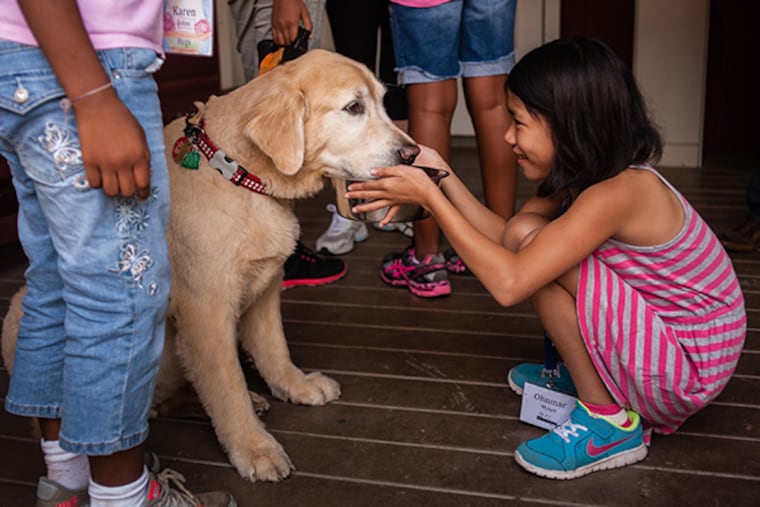Pa. camp helps youth affected by HIV/AIDS
It's not that the campers, counselors, and therapists who come together every year in Oxford, Chester County, had forgotten the reality of death that is part of living with HIV/AIDS.

It's not that the campers, counselors, and therapists who come together every year in Oxford, Chester County, had forgotten the reality of death that is part of living with HIV/AIDS.
How could they? The mission of Camp Dreamcatcher is to provide care, services, and a fun seven days for youth affected by the disease.
It had been more than a decade since Camp Dreamcatcher lost one of its own. Then, when counselor Evan Jones died three years ago at 22, his death shook the camp.
The response was to turn grief into action. Camp leaders started a program to help youth with HIV/AIDS cope with the independence of young adulthood while also maintaining their health.
That is an example of the philosophy that governs Camp Dreamcatcher, which ended its one-week summer session Friday at the 300-acre Camp Saginaw property in Oxford. As treatment, life expectancy, and social issues around HIV/AIDS have evolved and changed, so has the camp.
Now, the program that started in 1996 as a one-week refuge for 53 youngsters whose life expectancy then was between 10 and 12 years has been transformed. It is a year-round initiative - and one of only a handful of therapeutic camp programs in the nation. Besides the camp for ages 5 to 17, Camp Dreamcatcher offers programs for older teens and young adults who have HIV/AIDS or are related to someone living with the condition.
"We face everything head on," said camp founder Patty Hillkirk, 53, a psychotherapist. "I wanted a space where kids could talk about it and say: 'I have HIV. My mom has HIV. What is HIV? What does that mean?' "
Camp Dreamcatcher's activities include the typical - swimming, lacrosse, miniature golf, and fishing - and the unusual, including acupuncture, yoga, nutrition, and group therapy.
About 127 youngsters from the East Coast (about 50 with HIV/AIDS) attended this year's summer session.
Now that the camp is over, other programs kick in: a one-year mentorship initiative that pairs AIDS/HIV-affected youth with camp counselors, educational outreach to local groups, two annual scholarship awards, and retreats that focus on issues including teen leadership and life skills.
Counselor Miguel Correa, 24, of Lancaster, has grown up with Camp Dreamcatcher. His first encounter was as a 5-year-old who didn't really understand his HIV status.
"I just came to camp to be with my friends," said Correa, who sings in a rock band. "At home it wasn't really talked about."
Home for Correa, who was born with HIV, wasn't always a secure place. He became a foster child after his mother and father died of AIDS. Later, two of Correa's foster mothers died of cancer.
"I would be a very angry person without the camp," Correa said.
He has spoken at community events about HIV/AIDS issues. While he doesn't hide his status, he doesn't volunteer the information. There is still a stigma, he said.
Camp sessions deal with secrecy. Some kids scratch the labels of their medications so others won't know what they're taking, said Hillkirk, of Kennett Square.
Evan Jones, who was a camper before he became a counselor, didn't "tell everybody about his HIV status," says his adopted brother Cornell Mack, a camp counselor. But Jones, one of six campers who have passed away since 1996, didn't live life with "his head down," said Mack, 21, of Randallstown, Md.
"Everybody loved him," said Mack. "It was just mind-blowing when he died."
Mack has been attending the camp since he was 10, about seven years after Hillkirk founded it. Hillkirk was inspired to start the camp after a friend was diagnosed with HIV in the 1980s. Hillkirk went door-to-door to raise money.
Foundation grants and other charitable donations now fund the nonprofit's $280,00 annual budget. Hillkirk is the program's only full-time staffer, with four part-timers working during the summer camp session. About 240 others volunteer, mostly during the summer.
Last week, 15 campers gathered in the music therapy room, where they made up their own rap songs. Nearby, in group therapy, the youngsters talked about coping with anger and created handmade stress balls with cornstarch and a balloon.
Hillkirk drove around the camp in a golf cart, greeting campers and troubleshooting the day's problems. She has an affinity for Native American tradition and named the camp after the object that is said to catch bad dreams.
But Hillkirk's dream for the future is a good one - to buy a camping property that would serve as a home base from which Camp Dreamcatcher will be ready for the next stage of the fight against HIV/AIDS.
BY THE NUMBERS
53
Campers at the first Camp Dreamcatcher
in 1996.
127
Campers at Camp Dreamcatcher this year.
$280,000
Camp Dreamcatcher's annual budget.EndText
610-313-8211